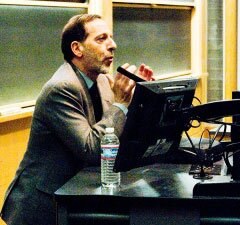By Sarah Forman, The Brown Daily Herald
Brown University, Providence, RI – 19 Feb 2010
www.browndailyherald.com/rashid-khalidi-offers-bleak-picture-of-palestine-s-future-1.2161105
Palestine faces enormous challenges that have only worsened over the past 20 years, and achieving stability and independence from Israeli occupation is becoming more and more unlikely, Rashid Khalidi, professor of modern Arab studies at Columbia, told a full MacMillan 117 Thursday night.
“A two-state solution looks a lot further off today than it did in the 1990s,” he said, listing off the major ways in which life for Palestinians has worsened.
“In spite of all of these vicissitudes,” he said, Palestinians have an “extraordinary solidarity of society” and general cohesiveness, so they may just escape their “very, very grim future.”
As he outlined the decline in prospects for peace and stability in Palestine, Khalidi spoke at length about “the fiction of a Palestinian Authority,” an administrative body created to govern the Palestinian territories. He claimed that the group has no real power, and that a “venomous” split between Fatah and Hamas, two rival political parties, has destroyed its legitimacy and effectiveness.
Suicide bombings during the First Intifada, a 1987–1993 Palestinian uprising against Israel, came about because of the “corrosive effect” of these political divisions, he said.
“Fatah competed with Hamas to see who could do the most horrible acts in Israel,” Khalidi said.
Palestine lost public favor because of this increased violence, Khalidi said, and Israel used the bombings as justification for more fervent occupation.
“Expansion of the Israeli matrix of control over Palestinians” has consumed Palestinian freedom, Khalidi said. “The kinds of restrictions on movement that exist today were unimaginable 20 years ago.”
Expanded Israeli settlements in the Gaza Strip and the West Bank have fractured the landscape, making it all but impossible to construct a contiguous Palestinian state, and Israel’s bureaucracy and economy have become increasingly dependent upon the continued occupation of Palestine, he said.
In order to negotiate a peace agreement, Khalidi said during the question-and-answerperiod, the mindset in Israel that “what’s mine is mine and what’s yours is negotiable” needs to change.
During previous negotiations, terms were drastically imbalanced against Palestinians, and Israel “was eating up what we were supposed to be dividing,” Khalidi said.
Despite Khalidi’s generally grim portrayal of Palestine’s likely future, the very diverse group of students, professors and community members who attended the lecture appeared enthused, with more people standing in line to ask questions than the lecture could accommodate.
“I think it’s wonderful that the lecture had such a broad representation of students,” said Henry Peck ’11, one of the four leaders of Common Ground: Justice and Equality in Palestine/Israel, which sponsored the event along with the Department of Middle East Studies and Vice President for International Affairs Matthew Gutmann.
“I thought it was phenomenal,” said Janine Khraishah ’12 of the lecture. She said she found it “particularly motivational,” and that she was “enraged by the current situation in Palestine.”
Brown Students for Justice in Palestine, a group whose steering committee Khraishah sits on, came to the event to distribute information.
“We’re here to talk about our divestment campaign,” said Ruhan Nagra ’10, another member of the steering committee. The group wants Brown to drop its investments in all companies that profit from the Israeli occupation of Palestinian territories, she said.
The group saw Khalidi as an advocate because he supported Hampshire College’s successful divestment campaign last year, she said.
“He portrayed a very real picture of what’s happening right now, why it’s happening and what we can do to change it,” Nagra said of Khalidi.
The death last week of Avi Schaefer ’13, who engaged in vigorous campus dialogue on the Israeli and Palestinian conflict, clouded the event. The organizers held a moment of silence beforehand, and Peck said, “The tragic event of a week ago certainly heightened awareness of efforts to foster peace.”







































